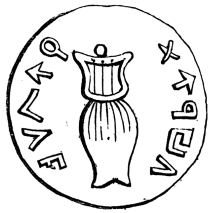WILLIS'S CURRENT NOTES
FOR THE MONTH.
NOTICE TO SUBSCRIBERS
G. Willis gratefully acknowledges the various interestingdocuments and letters he has received. He is anxiousthat it should be perfectly understood that he is not theauthor of any statement, representation, or opinion, thatmay appear in his "Current Notes," which are merely selectionsfrom communications made to him in the course ofhis business, and which appear to him to merit attention.Every statement therefore is open to correction or discussion,and the writers of the several paragraphs should beconsidered as alone responsible for their assertions. Althoughmany notes have hitherto appeared anonymously,or with initial letters, yet wherever a serious contradictionis involved, G. Willis trusts that his Correspondents willfeel the necessity of allowing him to make use of theirnames when properly required.
The Ancient Hebrew Harp.

Sir,—In Kitto's Biblical Cyclopædia, vol. 2. p. 373, wefind the following coin, onwhich is engraved an ancientharp surrounded by the letters,Fllth Chtr Phl, whichmay be construed thus:—
After referring the readersof "Current Notes" to the"London Encyclopædia," wordFalasha, and Prichard's PhysicalHistory of Mankind, vol. 1, "On the Races ofPeople in the Interior of Africa," let us have recourse toEtymology for a further elucidation of this singular coin,and the Semi-Jewish tribe whose name it bears.
Felatah.—Hebrew פלט phalat, which by comparisonwith its cognates signifies, to separate from, retire into,(another country); and with its affix פלטה phalatah,or Felatah, signifying evasio, liberatio, residuum, &c.
Cithara.—Greek κιθαρα. Hebrew and Chaldee חטרchatar, a stick, (plectrum), to beat with a stick; thereforethe instrument cannot be the עשׂוֹר asor, decachordon;but properly, I think, the harp or lyre that wasbeaten with the plectrum.
Pul.—Hebrew פול phul, or Pul, (Isaiah lxvi. 19.)"Africa, ea pars quæ apud Fesam."
Such is the value of rightly interpreting the ancientcoins of various nations.
T. R. Brown.
Southwick, Oundle, March 27th, 1852.
ARCHÆOLOGICAL PUBLICATIONS.
In compliance with the wish very generally expressedby G. W.'s Subscribers and Correspondents, particularlyby S. E. ("Current Notes" for March, p. 22,) G. W.has collected the titles of the chief Archæological publicationsin England, and in France and Germany. Theformer he believes to be nearly correct, but the latter isnecessarily very imperfect, with the exception of theNorth of France. Very few foreign Antiquarian publicationsfind their way to thi BU KİTABI OKUMAK İÇİN ÜYE OLUN VEYA GİRİŞ YAPIN!
Sitemize Üyelik ÜCRETSİZDİR!